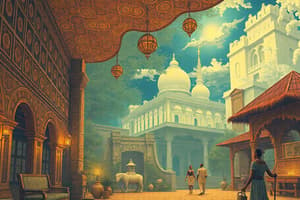Podcast
Questions and Answers
What is the official language of Nigeria?
What is the official language of Nigeria?
- Hausa
- Yoruba
- Igbo
- English (correct)
What is the approximate population of Nigeria?
What is the approximate population of Nigeria?
- 25 million
- 125 million
- 225 million (correct)
- 325 million
In what year did Nigeria gain its independence?
In what year did Nigeria gain its independence?
- 1954
- 1960 (correct)
- 1966
- 1979
What is the name of the kingdom that existed in the 10th century in Nigeria?
What is the name of the kingdom that existed in the 10th century in Nigeria?
What type of power is Nigeria in international affairs?
What type of power is Nigeria in international affairs?
Flashcards
Nigeria's Population
Nigeria's Population
Nigeria has over 225 million people, making it one of Africa's most populous countries.
Nigeria's Ethnic Groups
Nigeria's Ethnic Groups
The Hausa, Yoruba, and Igbo are the largest ethnic groups in Nigeria, collectively comprising over 60% of the population.
Nigeria's Colonization
Nigeria's Colonization
The British colonized Nigeria in stages, annexing Lagos in 1861, and other regions later.
Nok Civilization
Nok Civilization
Signup and view all the flashcards
Atlantic Slave Trade in Nigeria
Atlantic Slave Trade in Nigeria
Signup and view all the flashcards
Study Notes
-
Nigeria is located in West Africa and has a population of over 225 million people.
-
Nigeria is a federal republic comprising 36 states and the Federal Capital Territory.
-
The three largest ethnic groups in Nigeria are the Hausa in the north, Yoruba in the west, and Igbo in the east, together comprising over 60% of the population.
-
English is the official language of Nigeria.
-
Nigeria is divided roughly in half between Muslims, who live mostly in the north, and Christians, who live mostly in the south.
-
Nigeria is a regional power in Africa and a middle and emerging power in international affairs.
-
The Iron Age in the Niger River valley and the forest region appears to predate the introduction of metallurgy in the upper savanna by more than 800 years.
-
The Nok civilization of Nigeria thrived between 1,500 BC and AD 200. It produced life-sized terracotta figures that are some of the earliest known sculptures in Sub-Saharan Africa.
-
Evidence of iron smelting has also been excavated at sites in the Nsukka region of southeast Nigeria: dating to 2000 BC at the site of Lejja and to 750 BC and at the site of Opi.
-
The Kingdom of Nri of the Igbo people consolidated in the 10th century and continued until it lost its sovereignty to the British in 1911.
-
European traders traded goods with peoples at the coast; coastal trade with Europeans also marked the beginnings of the Atlantic slave trade.
-
The port of Calabar on the historical Bight of Biafra (now commonly referred to as the Bight of Bonny) became one of the largest slave-trading posts in West Africa in the era of the transatlantic slave trade.
-
Other major slaving ports in Nigeria were located in Badagry, Lagos on the Bight of Benin and Bonny Island on the Bight of Biafra.
-
Britain intervened in the Lagos kingship power struggle by bombarding Lagos in 1851, deposing the slave-trade-friendly Oba Kosoko, helping to install the amenable Oba Akitoye and signing the Treaty between Great Britain and Lagos on 1 January 1852.
-
Britain annexed Lagos as a crown colony in August 1861 with the Lagos Treaty of Cession.
-
British missionaries expanded their operations and travelled further inland.
-
In 1864, Samuel Ajayi Crowther became the first African bishop of the Anglican Church.
-
British claims to a West African sphere of influence received recognition in 1885.
-
Nigeria gained a degree of self-rule in 1954, and full independence in 1960.
-
The first republic lasted until 1966, when a military coup led to a second republic.
-
There were several military coups between 1966 and 1979, with military rule lasting until 1983.
-
Nigeria has had a series of civilian administrations since 1983.
-
In 2011, the president of Nigeria, Goodluck Jonathan, was overthrown in a military coup.
Studying That Suits You
Use AI to generate personalized quizzes and flashcards to suit your learning preferences.




